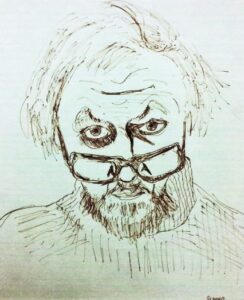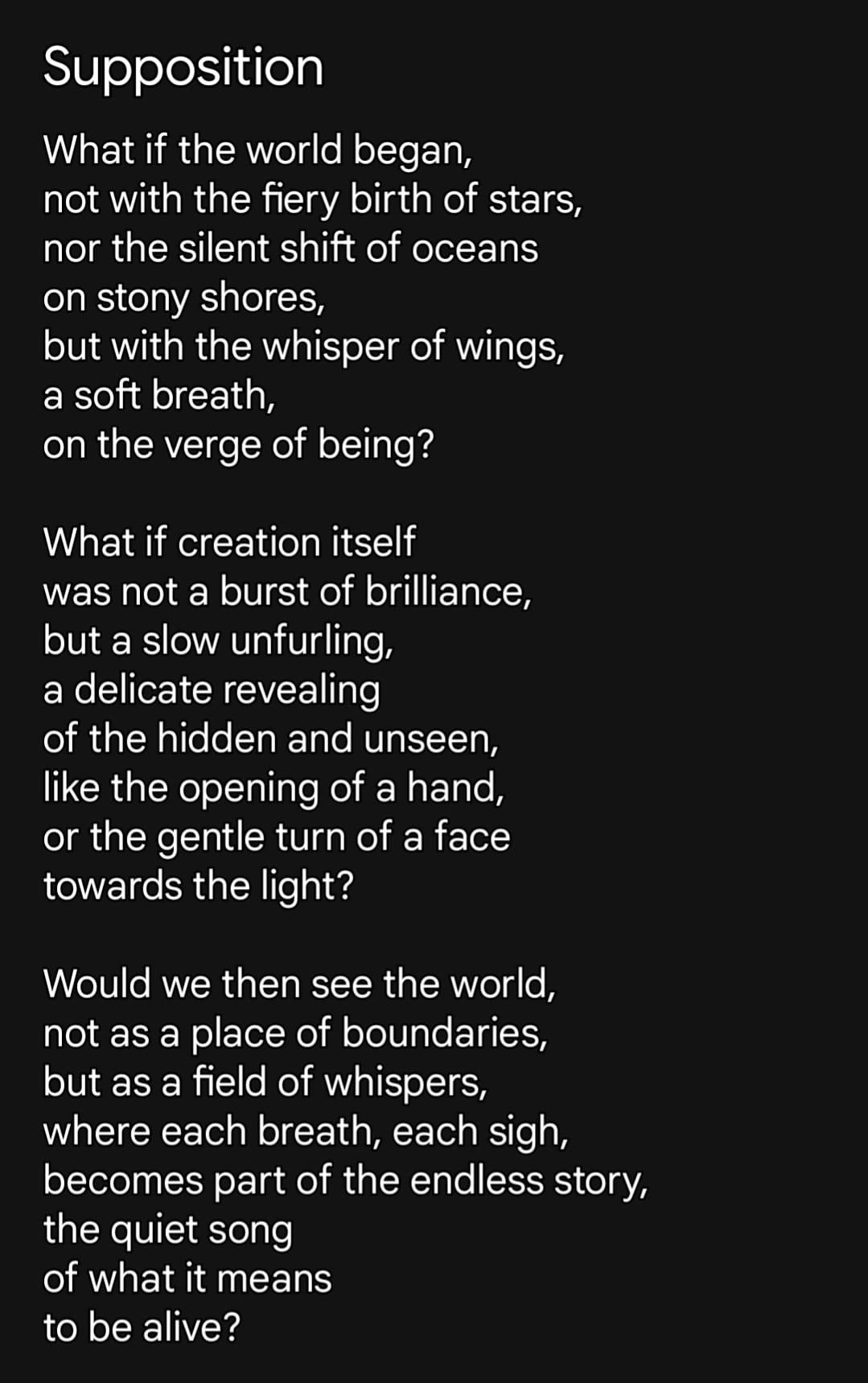THE DREAM SPA
Lucid Dreams
I
The Association for the Study of Lucid Dreams
summoned me to the Hotel Paradiso
to participate in a study in which I was to sleep
and be awakened while I was dreaming
and was to maintain my dream
and then to convert it
into whatever dream I wished it to become.
Lucid dreams are more vivid than common dreams.
Inscape is energized, so that the world of the dream
is like that of Hopkins or Van Gogh,
pulsating, dynamic, vital.
Such imagery is said to be
the manifestation of cosmic holograms,
and if I can convert them,
I can convert my life, like a wizard,
turn it into what I want it to be,
or wished it were or had become,
bring time back
with what and whom I loved, set a new
course for myself, and embark.
II
I saw white gulls arise, upon arrival,
from the emerald maze in the huge garden
surrounding the Hotel Paradiso. White gulls.
Don’t they always arrive with a ship,
following for her flotsam and jetsam?
And that night I dreamed I saw an instant,
which was a dewdrop in my dream,
yes, a dewdrop and a stellar instant,
like that of the wild gulls, pulling
the air with their wide wings,
an image, a vision of heavenly flight—
an ascent, a transcendence—
a nano-second and a shimmering drop,
or, shifting, a shimmering shield,
hovering in space, and what looked like
a moonbeam crossed the dark,
the silver dark of a swirling dust mote,
a hazed, illumined, impossible dark,
fingered, like a laser, touched the instant,
the drop, the Lilliputian planet,
with the most tender touch imaginable,
angling this way and that, so that
with each angle an entire eternal history was
displayed,
with all of the mass and multiplicity of life.
It seemed in my dream that there was no death,
but a cottage-coziness everywhere, and of us
and of the mountains and the waters, seemed
that all these are projections of personality,
(what I see I see because I am I)
spiritual manifestations, tilts at the dewdrop,
incarnations and aspects of the All-in-all,
the anomalon itself, yes, and even that sheen,
that spark, on the oriflamme of time; seemed
that we are the one hologram of life,
and that the family portrait
is the portrait of all who ever lived,
with mountains and waters and creatures
wild and domesticated; seemed that
the holographic plate is angled
for this simulacrum, this three-dimensional portrait
of a universe-apparent, which portrait
is not a memento mori but a glory
in a turning in time, a journey around a star.
My dream suggested that behind my waking back
a deeper reality existed;
not the reality I saw before me,
amazing pattern that it is,
a life-long complicated quilt,
tangible, deep in its seams,
full in its bosomy pads; but another,
finer, more heavenly, fabric, a cloth-of-gold,
glorious, gorgeous, radiant beyond imagination
with a light unknown here, waves
in an intensity beyond experience,
yet that do no damage to the eye,
light that seems to love the eye—
and that is the Word, I thought,
with new insight: Love—which is
expressed in its star-stuff, its human
potential, but never for good and all,
for there is more, we feel certain, we who
are the stars singing, the vibratory expression
of matter, tuning fork to tuning fork,
the template of interference-patterns making
concentric intersecting rings until
with perfect pitch achieved
the magical-appearing universe
leaps into view—until the great music
is made tangible and a table and chairs
and a world and a universe, full of stars
to look at, from a cottage
in an enchanted wood,
where I sit, appear.
When, like a man with warlock vision,
I watch the wilted wonders of my past
parade in phalanx, I dream
that I can change my present state
by intervening there,
where those wonders are and now parade,
multiplicities of self, time-separated,
rude and naked strutting fools,
but now, with a maturing vision,
refreshed with vivid hope,
their formation ordered,
their banners held high,
becoming what they might have been,
myself in time where time must be to make a memory,
and invested with new direction,
can have them at command fall out
or turn about or right or left,
know they are free in paradox,
not locked forever there, in constant error—
yet go on, the same, as if my will
required my life—perhaps
some missing faith, perhaps some expiation.
Again perhaps the wonders are mirage
and I was born this very instant,
tilted to a history and told a fate.
These reality fields are open for inspection,
like model homes, and, in an augenblick,
we are visiting an infinity of them.
They are where you are,
you need not go to see them:
no agent is necessary. Intersecting
concentric rings are vibrating
everything into view. The reality fields
present glories and horrors to behold:
they are moral reflections, purifying
the spirit, cleansing the dewdrop,
keeping it clear and clean, all
that I love borne with me
through time and back out of it,
the lovelight never out, always tilting,
becoming a new vision!
III
But a Bodhisattva,
or even a Beverly Hills guru,
might say, might well say, did say:
“Dead flesh is mad with flies.
The world is mad with lies!”
Memory, or lucid dream?
This hologram-like universe
seems solid, appears to have parts, can be
taken apart—(I, too, am like a child and
love a stack of gears)—so we take it apart,
emotionally, mechanically, mathematically,
take it apart as children will a watch,
begin to conceive of it as a watch, as Voltaire
did (and generously gave it a Watchmaker),
and become convinced that it is a kind of watch.
We lift out structures, sequences, relationships,
and rearrange them, and they become to us
what we have come to believe they are—
ballbearings unto infinity.
Answers generate questions in the mechanical sphere:
the universe expands, more complicates itself.
We are made to ask and so increase
dimension, to multiply dimensions, to make the
picture greater, more inclusive of the non-existent,
to take back the ghosts and reinvest them,
to live again in the mirage, to beat the golden soul
so fine it floats and flutters like a translucent gauze.
The impulsion to think is part of the expansion itself,
and we must think like messenger-angels,
in a completeness of service, or we confuse ourselves
and take the wrong turn, and miss the point—
shall we say the dewdrop—at which
courage and intelligence and praise
meet, and await us.
Biography

Author Self-Portrait
E. M. Schorb attended New York University, where he fell in with a group of actors and became a professional actor. During this time, he attended several top-ranking drama schools, which led to industrial films and eventually into sales and business. He has remained in business on and off ever since, but started writing poetry when he was a teenager and has never stopped. His collection, Time and Fevers, was a 2007 recipient of an Eric Hoffer Award for Excellence in Independent Publishing and also won the “Writer’s Digest” Award for Self-Published Books in Poetry. An earlier collection, Murderer’s Day, was awarded the Verna Emery Poetry Prize and published by Purdue University Press. Other collections include Reflections in a Doubtful I, The Ideologues, The Journey, Manhattan Spleen: Prose Poems, 50 Poems, and The Poor Boy and Other Poems.
Schorb’s work has appeared widely in such journals as The Yale Review, The Southern Review, The Virginia Quarterly Review, The Chicago Review, The Sewanee Review, The American Scholar, and The Hudson Review.
At the Frankfurt Book Fair in 2000, his novel, Paradise Square, was the winner of the Grand Prize for fiction from the International eBook Award Foundation, and later, A Portable Chaos won the Eric Hoffer Award for Fiction in 2004.
Schorb has received fellowships from the Provincetown Fine Arts Work Center and the North Carolina Arts Council; grants from the Ludwig Vogelstein Foundation, the Carnegie Fund, Robert Rauschenberg & Change, Inc. (for drawings), and The Dramatists Guild, among others. He is a member of the Academy of American Poets, and the Poetry Society of America.
PRIZE-WINNING BOOKS
BY E.M. SCHORB
Books available at Amazon.com
_______________________________________
Dates and Dreams, Writer’s Digest International Self-
Published Book Award for Poetry, First Prize
Paradise Square, International eBook Award
Foundation, Grand Prize, Fiction, Frankfurt Book Fair
A Portable Chaos, The Eric Hoffer Award for Fiction,
First Prize
Murderer’s Day, Verna Emery Poetry Prize, Purdue
University Press
Time and Fevers, The Eric Hoffer Award for Poetry
and Writer’s Digest International Self-Published Book
Award for Poetry, each First Prize
visit www.emschorb.com.








